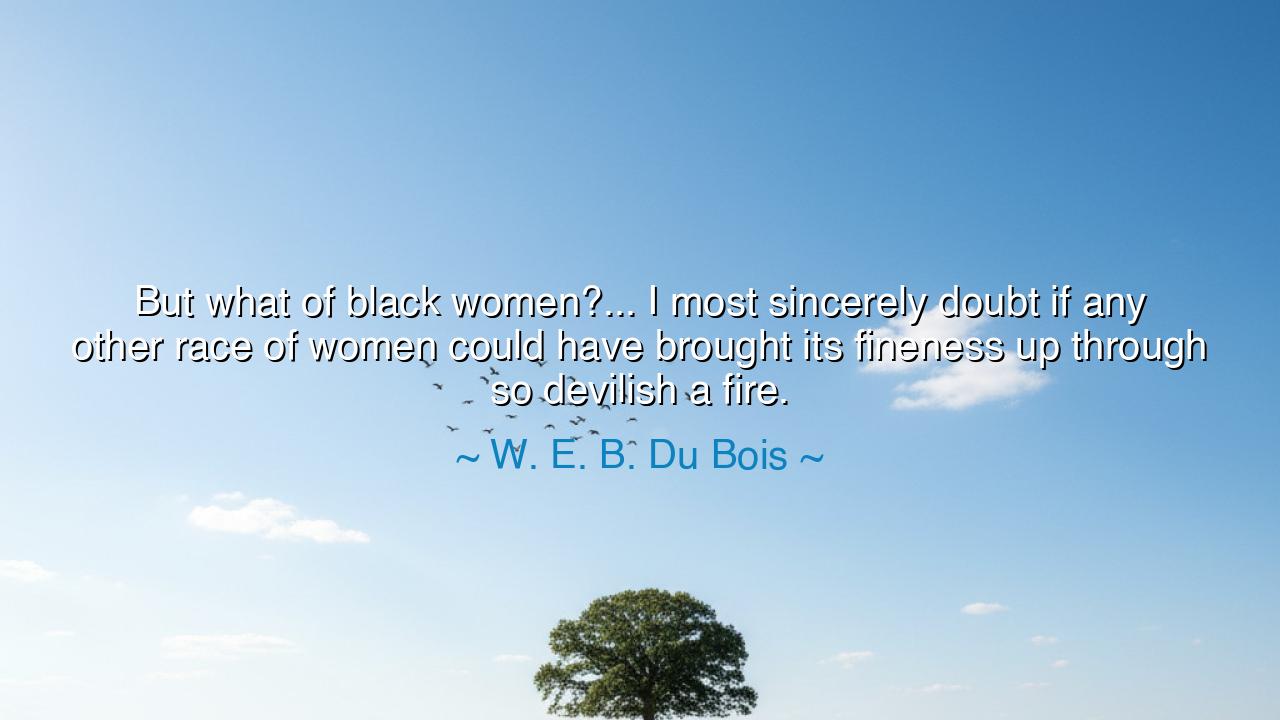
But what of black women?... I most sincerely doubt if any other
But what of black women?... I most sincerely doubt if any other race of women could have brought its fineness up through so devilish a fire.






The words of W. E. B. Du Bois, scholar, prophet, and warrior of the pen, blaze with reverence and sorrow: “But what of black women?... I most sincerely doubt if any other race of women could have brought its fineness up through so devilish a fire.” In this utterance, he honors the Black woman as the enduring spirit of a people, tested in the furnace of slavery, oppression, and poverty, yet emerging with a strength and grace that astonishes the world. For in her survival, her dignity, her unbroken will, lies the proof of a power forged in pain.
The ancients would have likened her to the phoenix, rising from ashes still radiant, or to iron refined by flame until it gleams with unbreakable strength. Where others might have been consumed, the Black woman endured the lash, the chain, the loss of children and homeland, and yet sang songs of faith, built homes from ruins, and carried generations upon her back. Du Bois reminds us that her fineness, her nobility, is not in spite of the fire but through it—an endurance that no other trial could reproduce.
Consider the story of Harriet Tubman, born in bondage, scarred by violence, yet who rose to lead her people through the shadows of slavery into freedom. She faced hunters, dogs, rivers, and the cold silence of forests, yet never faltered. Her courage was not born in comfort but in fire, and through her the truth of Du Bois’s words is seen: that Black women, though oppressed more fiercely than most, brought forth from that oppression not despair but greatness.
This saying is also a rebuke to those who dismiss or overlook the contributions of women, and especially women of color, in the struggle for liberty. Du Bois insists that without the resilience of Black women, the race itself could not have endured. Their bodies bore the labor, their spirits sustained the community, their faith carried children into a hostile world with hope still unbroken. Their fineness was not an accident of history, but a deliberate triumph of the soul.
Let the generations remember: the strength of the Black woman is one of the greatest monuments of human history. Where the fire was hottest, she endured; where the chains were heaviest, she bore them and still walked forward. Du Bois’s words are both honor and prophecy—reminding us that the survival of a people was written in the courage of its women, and that their fineness, born of fire, shines with a radiance that no oppression could extinguish.






NLHoang Ngoc Le
Du Bois' quote brings attention to the extraordinary endurance of Black women, who have navigated systemic oppression and racial injustice. His words echo the sentiment of survival against impossible odds. However, I wonder whether this focus on resilience can sometimes obscure the real need for structural and social changes. While it’s important to honor this strength, shouldn’t we also work to eliminate the ‘devilish fire’ they have had to endure?
DLtran duc lam
This quote speaks to the remarkable fortitude of Black women, who have faced unimaginable obstacles and yet still embody resilience and grace. But as I read it, I wonder: is there danger in framing their strength solely in terms of suffering? How do we ensure that we celebrate Black women’s contributions, joy, and accomplishments without reducing their experiences to a narrative of only hardship and survival?
MNLe Minh Nhut
W. E. B. Du Bois offers a thought-provoking and moving statement about the resilience of Black women. The metaphor of ‘devilish fire’ speaks to the unrelenting challenges they have faced. However, I think it's important to reflect on the broader implications—does this quote inadvertently romanticize suffering? How can we balance honoring Black women’s strength while also acknowledging the urgent need to dismantle the systems that continue to create such hardships?
VPChu Van Phuong
Du Bois’ words reflect a powerful acknowledgment of the strength of Black women, but they also raise questions about the collective struggles of women of all races. While I understand the historical context in which this was said, is it possible that such a statement could be read as isolating? By elevating the struggle of Black women, are we inadvertently comparing their suffering to others in a way that might minimize other experiences of oppression?
TD7. Nguyen Thanh Dat-12A1
This quote from Du Bois resonates deeply with the idea of resilience under extreme pressure. It speaks to the unique strength of Black women, having navigated both racial and gendered oppression for centuries. However, I’m curious if this focus on their endurance may inadvertently overshadow the need for systemic change. Shouldn't we also address the root causes of the ‘devilish fire’ rather than just honoring those who survive it?